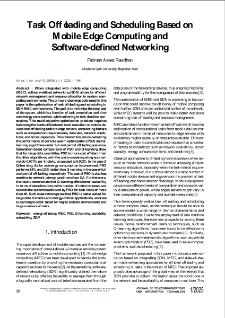Instytut Łączności – Państwowy Instytut Badawczy contains 2 325 digital objects
Object
Title: Task Offloading and Scheduling Based on Mobile Edge Computing and Software-defined Networking, Journal of Telecommunications and Information Technology, 2025, nr 1
Group publication title:
Description:
Abstrakt:
Number:
Publisher:
National Institute of Telecommunications
Resource Identifier:
DOI:
eISSN:
Source:
Journal of Telecommunications and Information Technology
Language:
Rights Management:
Biblioteka Naukowa Instytutu Łączności
License:
Object collections:
- Digital Library > Institute's Publications > Current Publications > Journal of Telecommunications and Information Technology (JTIT)
- Digital Library > Institute's Publications > Archives > Przegląd Prac Instytutu Łączności
Last modified:
Feb 25, 2026
In our library since:
Apr 14, 2025
Number of object content hits:
70
All available object's versions:
https://ribes-54.man.poznan.pl/publication/2691
Show description in RDF format:
Show description in OAI-PMH format:
Objects Similar
Malon, Krzysztof
Kalnoor, Gauri S, Gowrishankar
Arabas, Piotr Karpowicz, Michał
Arabas, Piotr
Benaouda, Nadjib
Zainun, Ayib Rosdi Shahab, Suhail Najm Abdulkafi, Ayad Atiyah
Shahid, Muhammad Khalil Eyob, Aman Ahmed, Irfan Debretsion, Filmon Faisal, Tarig
Yahya, Zahraa M. Al-Gailani, Mohammed F.

